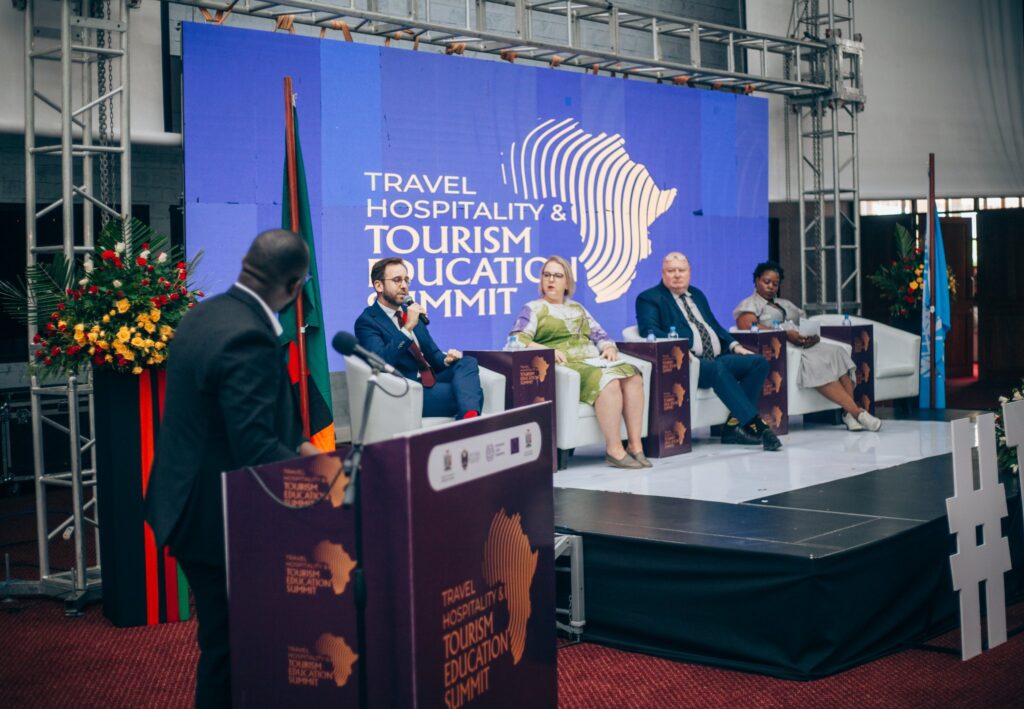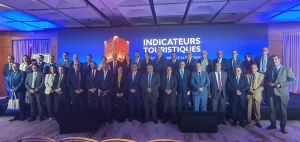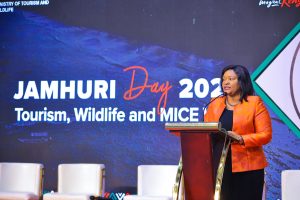At the 3rd Travel, Hospitality & Tourism Education Summit in Lusaka, one panel stood out for echoing the rallying call made earlier by UN Tourism Secretary-General Zurab Pololikashvili: that Africa must reimagine its tourism education to match the pace of industry transformation. The session, titled “Integrating Industry Needs and Innovation in Tourism Education”, brought together influential voices from academia and the private sector to chart a new path for preparing the next generation of tourism professionals.
Moderated by Mr Antonio López de Ávila, Director of Innovation, Education and Investment at UN Tourism, the conversation delved into how Africa – and the world – can better prepare students for the realities of a rapidly evolving tourism and hospitality sector.
The panel featured Laurent Schatzman, Employer Relations Director at the Swiss Education Group; Andre Mack from EHL Hospitality Business School in Switzerland; Dr Charles Ndakala of Zambia’s Curriculum Development Centre; and Ms Elwin Mary Mkanyika Mchigan from Kenya Utalii College. Each brought a unique perspective, but they were united in one belief: tourism education must evolve to meet the needs of the industry – and it must do so now.
Dr Ndakala began by speaking about Zambia’s shift towards a competency-based curriculum. With a deliberate emphasis on 70% practical skills and 30% theoretical knowledge, this model is designed to produce graduates who are ready to contribute from day one. He highlighted the role of the Tourism Industry Liaison Committee, which works closely with educational institutions to keep the curriculum aligned with industry trends. “We want our students not just to graduate but to be immediately relevant,” he said. The country’s commitment to continuous learning was also evident in the regular refresher courses and management development programmes offered to industry professionals.

Innovation, however, was not limited to curriculum design. Andre Mack offered a thought-provoking perspective, challenging the often-held belief that the hospitality industry is innovative. “The truth is, it’s usually the suppliers – those bringing in new technology and sustainable practices – who are the real innovators,” he argued. This insight prompted a deeper conversation about how educational institutions must look beyond the classroom and forge relationships with the companies driving change. Future-ready graduates, the panel agreed, must be exposed to technologies and trends that are shaping guest experiences today and tomorrow.
Entrepreneurship was another powerful thread in the discussion. Ms Michigan spoke passionately about the need to foster entrepreneurial thinking from an early age, even suggesting that financial literacy and basic business skills be introduced at the primary level. She emphasised the importance of teaching students how to write business proposals and develop viable business plans, not only as academic exercises but as practical tools for launching real ventures. “We’re not just training employees – we’re nurturing founders,” she said.
Laurent Schatzman added another layer to the conversation by focussing on the idea of intrapreneurship – the ability to think and act like an entrepreneur within an existing organisation. He stressed the importance of creating safe learning environments where students can take risks and learn from failure. “We must develop human skills alongside technical ones. Emotional intelligence, collaboration, adaptability – these are the real differentiators in today’s global tourism industry.”
Dr Ndakala echoed this sentiment, pointing to Zambia’s broader curriculum reforms that now incorporate competencies such as digital literacy, citizenship, innovation, and critical thinking. The aim is not just to prepare students for today’s jobs but to equip them to shape the future of the industry.
Throughout the conversation, one thing was clear: the future of tourism education lies in deep collaboration between institutions and industry, in bold curriculum reforms, and in a relentless focus on preparing students not just for employment, but for leadership and innovation.
The session concluded with a set of practical action points. From May 19 to 23, regional and national tourism competitions will be held to inspire innovation and real-world problem-solving among students. Refresher courses for educators and professionals will continue into late May and early June. And institutions were encouraged to expand entrepreneurship initiatives, placing greater emphasis on proposal writing and the creation of business plans.
As Mr López de Ávila aptly noted in his closing remarks, “We’re not just teaching students how to work in tourism – we’re empowering them to transform it.”







